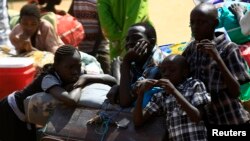UNITED NATIONS —
The United Nations Mission in South Sudan says rebels killed “hundreds” of civilians in ethnically-motivated attacks when they captured the town of Bentiu last week.
The U.N. strongly condemned what it called targeted killings of civilians which took place along national and ethnic lines.
In a statement, the U.N. mission, known as UNMISS, said more than 200 civilians were reportedly killed and over 400 wounded in the Bentiu's mosque, where they had gone to flee the violence.
It said fighters with the rebel force, known as the SPLA in Opposition, separated individuals based on their ethnicities and nationalities, safely escorting some out of the mosque and killing others.
Similar attacks were reported at a Catholic church, an evacuated World Food Program compound and Bentiu hospital. Sudanese of Darfuri ethnicity were also targeted.
The U.N. also condemned the use of the local radio station by rebels to incite killings and rape.
U.N. Peacekeeping Spokesman Nick Birnback told VOA that UNMISS has deployed additional peacekeepers from its 8,000-plus strong force to Bentiu and other locations where attacks have been reported.
“But the truth of the matter is, is we can’t be everywhere at all times," Birnback said. "Also, our peacekeepers are focusing on protection of civilian sites, where we are sheltering thousands and thousands of terrified IDPs [internally displaced persons] who are fleeing the violence and who are depending on us for their security.”
Last week, peacekeepers helped get hundreds of civilians in threatened areas in Bentiu and Rubknona to their base for protection. The base is now refuge for more than 20,000 people.
The U.N.’s Birnback said there is “a vicious cycle” of attack and counter-attack happening.
“Civilians are, as always, are bearing the brunt of it," Birnback said. "We are doing everything we can to work with local authorities to try to not only investigate, but deter. But ultimately, it is the authorities in South Sudan who are going to have to take action to stop these terrible events from continuing to occur.”
Fighting erupted in South Sudan in December, as the army of President Salva Kiir and rebels allied with his former vice president Riek Machar began fighting each other. Violence has now displaced more than one million South Sudanese from their homes.
The U.N. strongly condemned what it called targeted killings of civilians which took place along national and ethnic lines.
In a statement, the U.N. mission, known as UNMISS, said more than 200 civilians were reportedly killed and over 400 wounded in the Bentiu's mosque, where they had gone to flee the violence.
It said fighters with the rebel force, known as the SPLA in Opposition, separated individuals based on their ethnicities and nationalities, safely escorting some out of the mosque and killing others.
Similar attacks were reported at a Catholic church, an evacuated World Food Program compound and Bentiu hospital. Sudanese of Darfuri ethnicity were also targeted.
The U.N. also condemned the use of the local radio station by rebels to incite killings and rape.
U.N. Peacekeeping Spokesman Nick Birnback told VOA that UNMISS has deployed additional peacekeepers from its 8,000-plus strong force to Bentiu and other locations where attacks have been reported.
“But the truth of the matter is, is we can’t be everywhere at all times," Birnback said. "Also, our peacekeepers are focusing on protection of civilian sites, where we are sheltering thousands and thousands of terrified IDPs [internally displaced persons] who are fleeing the violence and who are depending on us for their security.”
Last week, peacekeepers helped get hundreds of civilians in threatened areas in Bentiu and Rubknona to their base for protection. The base is now refuge for more than 20,000 people.
The U.N.’s Birnback said there is “a vicious cycle” of attack and counter-attack happening.
“Civilians are, as always, are bearing the brunt of it," Birnback said. "We are doing everything we can to work with local authorities to try to not only investigate, but deter. But ultimately, it is the authorities in South Sudan who are going to have to take action to stop these terrible events from continuing to occur.”
Fighting erupted in South Sudan in December, as the army of President Salva Kiir and rebels allied with his former vice president Riek Machar began fighting each other. Violence has now displaced more than one million South Sudanese from their homes.




